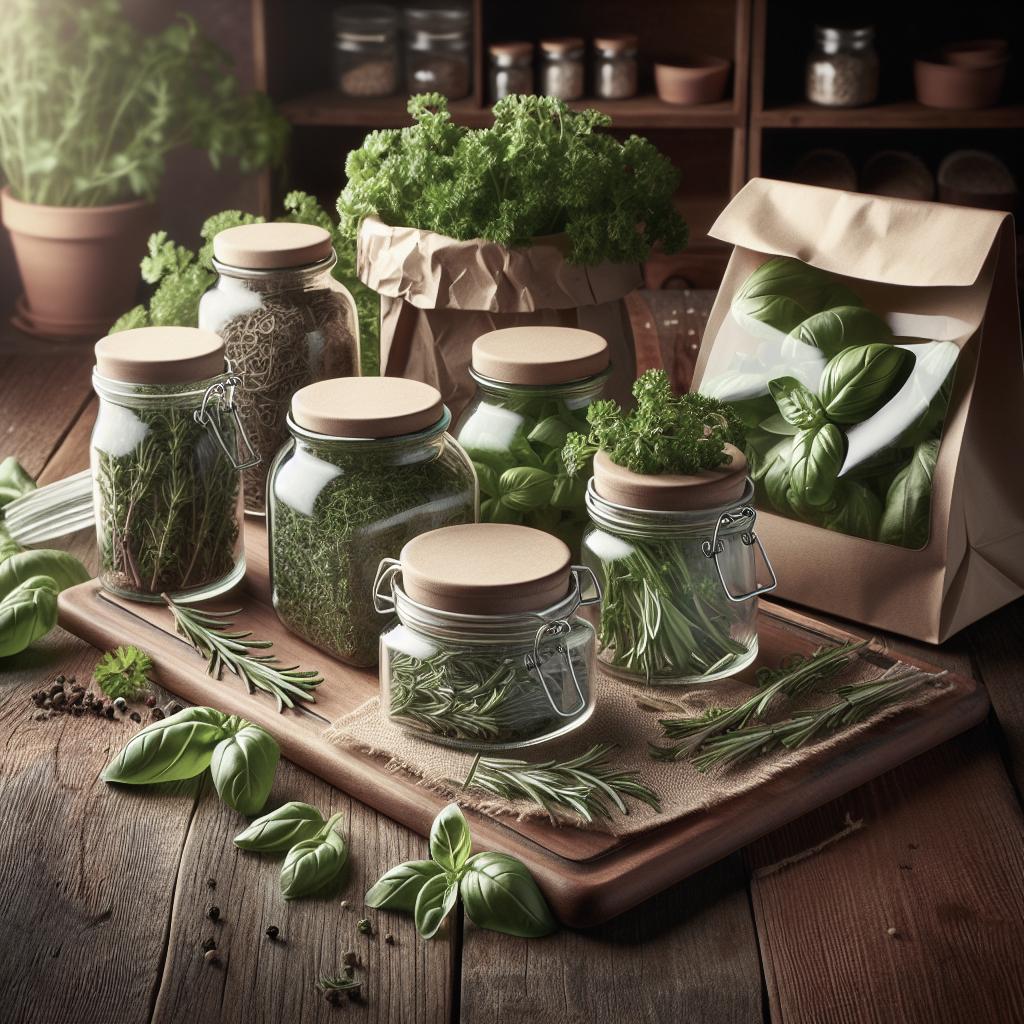“`html
The Best Way to Store Herbs
Have you ever been frustrated by buying fresh herbs only to see them wilt and spoil in a matter of days? Fear not! Storing herbs properly prolongs their shelf life, ensuring you always have a burst of flavor on hand to elevate your dishes. This post covers efficient storing techniques, common pitfalls to avoid, and whether washing herbs is crucial prior to storage. We’ll explore both traditional and alternative storage methods that maintain freshness, providing thorough guidance to help you get the most out of your culinary herbs. Dive in to learn these valuable tips and tricks!
The Quick Version
For busy cooks, having herbs ready to use is essential. Quickly, you can keep tender herbs like cilantro and parsley in a glass of water in the fridge, much like a floral arrangement, while tougher herbs like rosemary and thyme are best stored wrapped in a damp paper towel and placed in a plastic bag. Using these methods, you’ll find herbs delightfully fresh when the inspiration to cook strikes.
However, for those who seek an even easier method, investing in an herb keeper—special containers designed to maintain optimal conditions for herb preservation—could be the key. While these solutions provide a short-term fix, they’re often enough to keep herbs fresh for about a week, ensuring your culinary creations always taste fresh.
The Long Version
Diving deeper, preserving herbs goes beyond the basics of clipping and containing. Successful storage starts with understanding the nature of each herb and tailoring care to suit their characteristics. Tender herbs, which are usually green and leafy, thrive best in an environment similar to fresh flowers. Ensure that they drink enough water by checking and changing it every couple of days.
Contrarily, hardier herbs have firm, woody stems and prefer a drier environment. Storing these in a breathable bag prevents moisture build-up that could lead to mold or decay. Mastering these methods takes a bit of practice but offers the reward of vibrant, aromatic herbs ready to enhance your meals.
To Wash or Not to Wash?
Upon bringing herbs home, the question of washing often arises. If the herbs are visibly dirty, a gentle rinse is advisable. Clean them under cold water immediately, then thoroughly dry before storing. This prevents excess moisture from hastening spoilage.
For pristine herbs, skip the wash until just before use. This minimizes handling, reducing the chance of bruising delicate leaves. A quick wash prior to use ensures cleanliness without compromising shelf life—always a balancing act when striving for freshness and convenience.
The Enemies of Freshness
Herbs have a few nemeses: moisture, air, and light. Too much moisture encourages decay, while exposure to air and heat can cause wilting and loss of flavor. It’s crucial to balance these environmental factors to extend the life and potency of your herbs.
Understanding these risks empowers you to counteract them effectively. Whether through precise storage methods or mindful use, controlling these variables can help mitigate spoilage and enjoy the full spectrum of taste and aroma fresh herbs offer.
Storage Methods
For optimal storage, understand the two distinctions in herbs: tender and hardy. Tender herbs, such as basil or parsley, are best kept with their stems submerged in a jar of water, covered loosely with a plastic bag in the fridge. They thrive in such a watery setup, offering weeks of usability if done properly.
On the other hand, hardy herbs like rosemary benefit from being wrapped in damp paper towels. Once prepped, insert them in a ziplock bag to retain just enough moisture without sealing tight, giving you more control over the lifespan of these valuable kitchen components.
Alternative Storage Methods: Drying and Freezing
Sometimes even the most strategic methods won’t save fresh herbs from expired doom. In these cases, drying or freezing presents an excellent alternative means of preservation. Drying herbs, either by air or using a dehydrator, concentrates flavors and allows for an extended shelf life.
Freezing is another option, especially in handy ice cubes. Trapping herbs in olive oil or butter within ice cube trays not only maintains their vibrant flavors but also provides an easy-to-utilize format for future cooking endeavors, seamlessly blending convenience with longevity.
April 2015
April marks a peculiar month for herbs, with the onset of some fresh harvests while finishing off winter batches. It brings a chance to evaluate existing storage techniques, perhaps adopting new ones for the burgeoning varieties cropping up. Herb enthusiasts find joy in this period as nature offers freshness and rejuvenation.
Moreover, it’s a good time to reacquaint oneself with drying or freezing methods if you find your kitchen awash with more greenery than you can possibly use. Embracing both traditional and experimental storage methods helps strike a balance between culinary delights and long-term preservation.
Read More
Feeling inspired and eager to dive into more kitchen tips? Expanding your culinary skills can be as simple as understanding food safety practices, meal prepping, and trying new cooking techniques. Whether you’re a seasoned chef or a novice cook, continual exploration and learning will enrich your culinary experience.
Don’t stop here—explore other articles that deepen your culinary knowledge base, learn about sustainable cooking, and find more ways to make the best use of your herbs and other kitchen staples. Every little trick and tip expands your kitchen prowess, ensuring flavorful, vibrant meals that tantalize the taste buds.
Lessons Learned
| Factor | Tender Herbs | Hardy Herbs | Alternative Methods |
|---|---|---|---|
| Storage | In water, covered loosely, refrigerated | Wrapped in damp paper towel, in a bag | Dry or freeze in oil/butter cubes |
| Washing | Rinse if dirty, dry thoroughly | Rinse if needed, dry before storage | Wash before processing |
| Key Enemies | Moisture, air, light | Moisture, mold | Air, light post-processing |
“`

